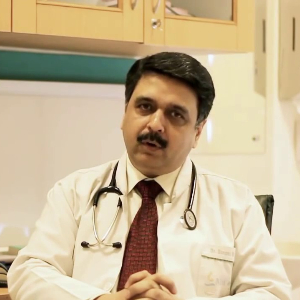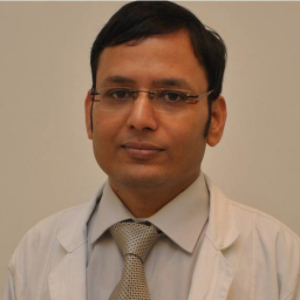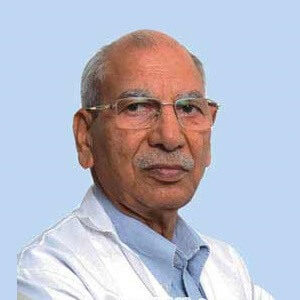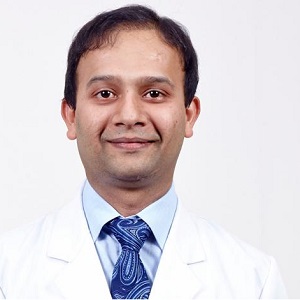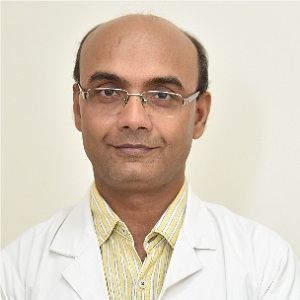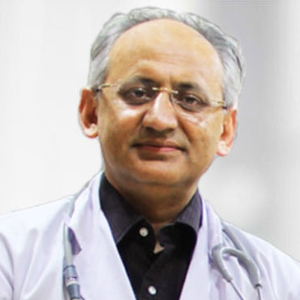Best Doctors in India for Alcoholic Hepatitis Treatment
- Nephrologist, New Delhi, India
- Over 25 years’ experience
Profile Highlights:
- Dr. Dinesh Khullar with an experience of over 25 years as a renal transplant physician, has been associated with over 5000 successful kidney transplants in his career. Out of these, more than 1200 were performed at Max Hospital, Saket. This includes among the most challenging transplants, such as ABO-incompatible, transplantations in highly sensitized recipients, and high-risk transplants associated with significant comorbidities.
- In addition to this, Dr. Dinesh Khullar is credited for setting up an online hemodiafiltration unit for the first time in North India for advanced and state-of-the-art dialysis.
- Hematologist, Gurugram, India
- Over 17 years’ experience
Profile Highlights:
- Dr. Rahul Naithani is a reputed clinical hematologist. After his return from Canada, Dr. Naithani started his Hematology and Bone Marrow Transplant program at Max healthcare and is known to have performed over 130 BMTs in the past. Currently, he is the Director of Bone Marrow Transplant in Paras Hospital.
- His incredible skills and proficient work experience are currently helping him indulge in scientific research with multiple publications to his credit helping the national and international medical industry greatly.
- Dermatologist, New Delhi, India
- Over 35 years’ experience
Profile Highlights:
- Dr. D M Mahajan is a proficient dermatologist who specializes in wrinkle treatment and skin peeling
- Dr. Mahajan has bagged 35 years of experience and helped many patients get rid of their skin diseases.
- Cosmetic & Plastic Surgeon, New Delhi, India
- Over 52 years experience
Profile Highlights:
- Dr. Indrapati Singh is one of the best cosmetic surgeons in India with extensive experience. He works as a senior cosmetic surgeon at the Indraprastha Apollo Hospital in New Delhi.
- Dr. Singh specializes in Plastic, Cosmetic, and Reconstructive Surgery and has over 52 years of combined expertise.
- He has successfully performed plastic and cosmetic surgery treatments on all parts of the body. His surgeries on the head, face, neck, and body improve one’s attractiveness. Aesthetic augmentation/reduction, liposuction, vaginal tightness, body contouring, and even hair transplantation are among the therapies available with him.
- Dermatologist, Gurugram, India
- Over 10 years’ experience
Profile Highlights:
- Dr. Naresh Jain is one of those few Dermatologists in India who has been associated with the premier institutions in his lifetime.
- He has vast experience in Clinical Dermatology, Pediatric Dermatology Dermatosurgery, Aesthetic Medicine, and Sexually transmitted diseases.
- He has treated several critical disease conditions like Vitiligo, Systemic Lupus Erythematosus, Botox, and fillers.
- Dermatologist & Cosmetologist, New Delhi, India
- Over 16 years’ experience
Profile Highlights:
- Dr. Lipy Gupta is one of the leading dermatologists in India
- She has expertise in dermatology, cosmetology, and laser therapy.
- Her desire is to offer the latest and most effective skincare and beauty procedures for which she constantly updates her techniques and extensive knowledge of the subject by attending training workshops and seminars.
- Paediatric Cardiologist, Chennai, India
- Over 10 years’ experience
Profile Highlights:
- Dr. Muthukumaran C S is one of the finest Heart Specialists in India. He has successfully operated on more than 2500 cardiac catheterizations in children, 1000 AD closures, 250 VSD closures, and 700 PDA closures.
- The Medical practitioner has been associated with various reputed hospitals in India. Dr. Muthukumaran C S has been associated with many hospitals over the course of his illustrious and experienced career.
- Nephrologist, Gurugram, India
- Over 20 years’ experience
Profile Highlights:
- Dr. Shashidhar Shree Niwas is a well-known nephrologist in Delhi/ NCR with expertise in nephrology, dialysis, kidney disease, and transplantation.
- He has many National as well as International publications to his credit. Some of his national publications include ‘Acute Kidney Injury in HIV positive Patients’, ‘Coronary Artery Disease in Diabetes Mellitus’ etc. His paper on ‘Acute Kidney Injury in Developing Countries’ was published in a very prominent international journal.
- Orthopedic Surgeon, Gurugram, India
- Over 25 years’ experience
Profile Highlights:
- Dr. Ravi Sauhta is a renowned Orthopedic Surgeon in India with 25+ years of experience in Joint Replacement and Reconstruction surgeries.
- He was the first surgeon in India to use minimally invasive AO techniques for trauma and also introduced reconstructive pelvic acetabular surgery and reconstructive bone tumor surgery in 1995.
- IVF Specialist, Gynaecologist & Obstetrician; Mumbai, India
- Over 10 years’ experience
Profile Highlights:
- Dr. Ritu Hinduja is a renowned Infertility expert in Mumbai with experience in the management of infertility and reproductive medicine and has training in all assisted reproduction techniques (ART).
- She holds a Masters degree in Reproductive Medicine and also has a Diploma in the same field from Keil University in Germany.
- Dr. Hinduja’s primary interest lies in the management of patients with fertility issues that include low ovarian reserve and preserving fertility for cancer patients and women who want to delay childbearing by freezing eggs.
Best Hospitals in India for Alcoholic Hepatitis Treatment
ALCOHOLIC HEPATITIS
Alcoholic hepatitis is a liver infection, which is mainly caused by frequent, heavy use of alcohol. Fat can build up in the liver cells, which might lead to inflammation as well as scarring of the liver.
Alcoholic hepatitis might be mild or severe. A patient might even need a liver transplant if proper treatment is not provided, or if they don’t stop consumption of alcohol.
It is also notable that all heavy drinkers don’t develop this condition, and sometimes this condition even develops in people who drink moderately. However, if you are diagnosed with this condition, it is important for you to quit drinking alcohol. People who continue drinking alcohol might face a huge risk of serious liver damage as well as death.
Symptoms
Depending on the amount of damage to the liver, the symptoms can vary. If you are having a mild form of the disease, you might not even experience any symptoms at all. However, as the damage continues to grow, you might experience the following:
- Changes in appetite
- Dry mouth
- Weight loss
- Pain or swelling in the abdomen
- Jaundice, or yellowing of the skin or eyes
- Fever
- Nausea and vomiting
- Easy bleeding or bruising
- Changes in your mental state, including confusion
- Fatigue
The symptoms of this condition are similar to those caused by a few other health conditions. Therefore, if you develop any of these symptoms, it is best to get a proper diagnosis as well as begin treatment.
Causes & risk factors
Alcoholic hepatitis generally develops when the alcohol you drink causes damage to your liver. However, it is not clear why alcohol does this damages only to some heavy drinkers.
Few factors that are known to play a role in this condition include:
- The body’s process that breaks down alcohol produces some toxic chemicals
- These chemicals can trigger inflammation that can destroy the liver cells
- Thus, over time, scars replace healthy liver tissue, thus interfering with the function of the liver
- This irreversible scarring, which is also termed cirrhosis, is the final stage of alcoholic liver disease
If you have hepatitis C and continue to drink, even moderately, you are more likely to develop cirrhosis.
Some heavy drinkers are also malnourished because they don’t eat a proper balanced diet. Alcohol and its byproducts also prevent the body from absorbing nutrition properly. Lack of nutrition can contribute to liver cell damage.
Some other risk factors that can lead to this condition include:
- Your sex- Women are usually at a higher risk of developing alcoholic hepatitis since the way alcohol is processed in women is different.
- Binge drinking- Having over five drinks within two hours for men and four or more for women can increase the risk of alcoholic hepatitis.
- Obesity- Heavy drinkers who are overweight are also more likely to develop alcoholic hepatitis and to progress from that condition to cirrhosis.
- Race and ethnicity- Hispanic and Negroid people might be at higher risk of alcoholic hepatitis.
- Genetic factors- According to studies, there may be a genetic component in alcohol-induced liver disease. However, it is difficult to separate genetic and environmental factors.
Diagnosis
If you are showing symptoms of alcoholic hepatitis, your doctor will first inquire about your medical history and alcohol consumption. Next, he/she will perform a physical exam to see if you have an enlarged liver or spleen. They might also need a few more tests to confirm your diagnosis, such as:
- Complete blood count (CBC)
- Liver function test
- Ultrasound of the liver
- Abdominal CT scan
- Blood clotting tests
In some cases, a liver biopsy might also be needed to confirm the diagnosis of alcoholic hepatitis. A liver biopsy requires your doctor to remove a tissue sample from your liver, which is then tested in the lab. This method helps to show the severity and type of liver disease.
Treatment
Stopping alcohol consumption is the most important treatment for alcoholic hepatitis. There is no cure for this condition, but treatment can help in reducing or eliminating symptoms, or stopping its progression.
It is also important to note that scarring of the liver is permanent, but treatment can aim to restore as much function as possible.
Dietary changes
Medication
Liver transplant
The best hope of recovery is to be aware of the signs and symptoms as well as to reduce, manage, or if possible, completely stop consumption of alcohol.
Complications
Alcoholic hepatitis might lead to severe other complications such as:
- Enlarged veins (varices)- In this condition, blood that is unable to flow freely through the portal vein, can back up into other blood vessels in your esophagus or stomach.
- Hepatic encephalopathy- This condition can be caused by the buildup of toxins if your damaged liver is unable to remove all the toxins from your body. It involves confusion, drowsiness, and slurred speech.
- Ascites- Ascites is a condition in which the fluid that accumulates in the abdomen may get infected and thus, require treatment with antibiotics. Although this condition is not life-threatening, it can be a sign of advanced alcoholic hepatitis, or cirrhosis.
- Kidney failure- A damaged liver affects blood flow to the kidneys, thus resulting in kidney failure.
- Cirrhosis- The scarring of the liver might lead to liver failure.
Prevention
Alcoholic hepatitis might be prevented if you take the following steps:
- Drink alcohol in moderation, if at all- For healthy adults, moderate drinking means no more than one drink a day for women of all ages and men older than 65, and not over two drinks a day for men aged 65 and younger. However, if you prevent all alcohol, it is a certain way to prevent this condition.
- Check before mixing medications and alcohol- Ask your doctor if it’s safe to drink alcohol while you are taking medications. Consider reading the warning labels on over-the-counter medications as well. Don’t drink alcohol when you are taking medications that warn of complications when combined with alcohol.
- Protect yourself from hepatitis C- Hepatitis C is an infectious liver disease that is caused by a virus. If it is left untreated, it may lead to cirrhosis. If you are having hepatitis C and you consume alcohol, you’re generally more likely to develop cirrhosis than if you don’t drink.

